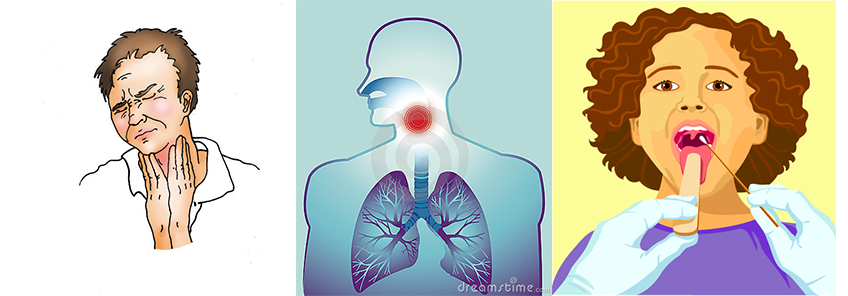Sore Throat

Sore throat (Pharyngitis & Tonsillitis) refers to pain, irritation or itchiness of the throat resulting from inflammation of the lining of throat and tonsils. It is common infection in children, but can affect people of any age. Symptoms include dryness of throat, swollen glands in the neck, muffled voice, difficulty swallowing and white patches on the tonsils. People with sore throat may also experience other symptoms like fever, chills, body aches, headache, coughing and runny nose.
Sore throat is usually caused by a viral infection and resolves by itself with home remedies. However, throat infections caused by bacteria may cause abscess (pus collection) and require treatment with antibiotics. Certain strain of Streptococcus bacteria may result in complications like rheumatic fever or glomerulonephritis (inflammation of tiny blood vessels called glomeruli in the kidneys). Rheumatic fever can damage heart valve.
Causes
These are some of the causes of sore throat:
- Viral Infection: Viral infection is the most common cause of a sore throat. Viruses causing pharyngitis include: influenza (Flu) virus, rhinovirus, adenovirus, Epstein-Barr Virus (EBV), cytomegalovirus (CMV), human immunodeficiency virus (HIV).
- Bacterial Infection: Streptococcal infection, Diphtheria.
- Tumors: Cancers of the throat or tonsils.
- Environmental factors: Environmental allergens such as, mold, pet dander, pollen, air pollution or exposure to cigarette smoke can also cause a sore throat.
Home remedies
Home remedies for sore throat include:
- Gargle with warm salt water which relieves the pain and soothes the throat.
- Maintain adequate hydration by drinking adequate water.
- Drink comforting liquids like warm water mixed with honey or soft cold food like pudding or milkshakes.
- Avoid ingestion and inhalation of throat irritants and allergens, such as smoke, chemicals or dusts.
- Steam inhalation and humidification of air (for example, sitting in a hot steamy bathroom for several minutes).
- Reduce inflammation and pain with Paracetamol. Ibuprofen or other non-steroidal anti inflammatory drugs (NSAIDs) should be avoided if you have peptic ulcer disease or are at risk of bleeding. Aspirin should be avoided in children.
Treatment
Treatment of sore throat depends on cause and severity of the symptoms. History, physical examination, throat swab and blood tests help in finding cause of sore throat.
- Most cases of sore throat are self-limiting and can be treated with Paracetamol and warm salt water gargle.
- Streptococcal sore throat is treated with antibiotics.
- Complicated streptococcal sore throat needs drainage of abscess (pus) or long term antibiotics for rheumatic fever.
- Decongestant and steroid nasal spray may be required for sore throat with nasal congestion.
- Tonsillectomy may be required for recurrent tonsillitis.
When to see the doctor
You should see the doctor if any of the following signs are present with sore throat:
- Sore throat accompanied by fever more than 101oF, joint pain, difficulty breathing or swallowing, neck lump, skin rash, or dark urine.
- When sore throat lasts longer than a week.



Send us your feedback on this article